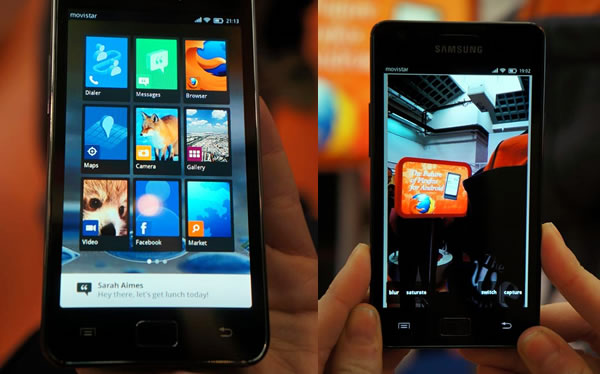 Mozilla has been talking about its Boot 2 Gecko mobile operating system for some time, but it hasn't shown it off in public until recently at Mobile World Congress 2012. The Boot 2 Gecko OS is entirely open source and its interface is built with HTML5 and CSS web standards, making it extremely customizable.
Mozilla has been talking about its Boot 2 Gecko mobile operating system for some time, but it hasn't shown it off in public until recently at Mobile World Congress 2012. The Boot 2 Gecko OS is entirely open source and its interface is built with HTML5 and CSS web standards, making it extremely customizable.
Mozilla demoed the new OS and a proof of concept interface on a Samsung Galaxy S II. The Boot 2 Gecko OS is built upon a Linux kernel, and Mozilla has developed various APIs for functions such as the phone dialer, camera, and 3D graphics. Developers can then tap into those APIs to create interfaces and apps. The proof of concept that we saw was just an example of such interfaces, but since Boot 2 Gecko is entirely open source, carriers and device manufacturers can have a field day with it.

Mozilla stressed how light the interface was, but it wasn't exactly the fastest while we were using it. Touch events and operations were responsive, but framerates for animations were less than smooth - certainly not what we would expect from a device that has the hardware chops of a Galaxy S II. The most impressive part was the 3D graphics demo that Mozilla built, as framerates were smooth and interactions were properly tracked. We couldn't properly test the browser, unfortunately, since there wasn't any connectivity available.
Boot 2 Gecko does have an app store for various webapps that users can purchase and download directly to their phones. There is also a full SMS client and on-screen keyboard that developers can access.
Mozilla has already partnered with European carrier Telefonica to put Boot 2 Gecko on a shipping device, though Telefonica's user interface is completely different from what was shown to us by Mozilla. That is more or less the point of Boot 2 Gecko: since it uses web standards, it can be customized at will. Mozilla has more announcements planned for the future, including other operators and manufacturers. There may be some point in time when you have a Boot 2 Gecko phone in your hand, but you might just not know it.
https://www.techspot.com/news/47747-mozillas-boot-2-gecko-mobile-os-hands-on.html